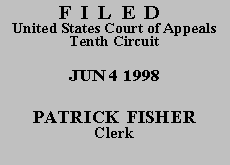

| ROD DIDERICKSON, a patient at the Utah State
Hospital, individually and on behalf of all others
similarly situated; CLARA DIDERICKSON,
Plaintiffs-Appellants, and CHRISTOPHER O'LEARY, involuntary civil committee, Plaintiff, v. DOCTOR ANTHONY GILLETT, in his official capacity as treating psychiatrist; RICHARD SPENCER, in his official capacity as Clinical Director of the Utah State Hospital; MEREDITH ALDEN, in her official capacity as Executive Director of the Division of Mental Health; ROD BETIT, in his official capacity as Executive Director of the Department of Human Services; WAYNE BROWN, Dr., in his official capacity as treating psychiatrist, Defendants-Appellees, and MILO ANDREUS, Dr., and WARD M. HEDGES, M.D., in their official capacities as treating psychiatrists, Defendants. |
|
The Didericksons' complaint in district court alleged they were medicated with psychotropic drugs against their will, and that they suffered unnecessary roughness and were unnecessarily restrained at the Hospital. The complaint did not request relief for failure to appoint a guardian to exercise substituted judgment on their behalf, and the district court's order did not discuss appointment of a guardian. The Didericksons raise this issue for the first time on appeal.
As a general rule, we do not decide issues initially raised on appeal. See Tele-Communications, Inc. v. Commissioner, 104 F.3d 1229, 1232 (10th Cir. 1997); Lyons v. Jefferson Bank & Trust, 994 F.2d 716, 720-21 (10th Cir. 1993). This rule sensibly prohibits a party from losing "in the district court on one theory of the case, and then prevail[ing] on appeal on a different theory." Id. at 721.
Review of issues not raised below would require us frequently to remand for additional evidence gathering and findings; would undermine the need for finality in litigation and conservation of judicial resources; would often have this court hold everything accomplished below for naught; and would often allow a party to raise a new issue on appeal when that party invited the alleged error below.
Tele-Communications, 104 F.3d at 1232.
The Didericksons argue they raised the issue by referencing the fact they were forcibly medicated while at the Hospital and by citing cases that address guardianship issues in their complaint. However, vague, arguable references to a point in the district court proceedings do not preserve the issue on appeal. Lyons, 994 F.2d at 721. Since the Didericksons did not challenge the Hospital's failure to provide them with a guardian in district court, they have failed to preserve the issue on appeal.
The Didericksons also argue we should decide the guardianship issue to "prevent manifest injustice" under the "exceptional circumstances" presented in their appeal. See Okland Oil Co. v. Conoco, Inc., ___ F.3d ____, 1998 WL 251130 *21 n.4 (10th Cir. May 19, 1998). We note that the Didericksons' appeal was argued the same day this court heard oral argument in Jurasek v. Verville, et al., Case No. 97-4082. In stark contrast to the Didericksons' appeal, Jurasek raised the guardianship issue in his complaint, briefed the issue before the district court, and fully developed the record for appeal. Moreover, the district court considered the parties' arguments and relevant case law and ruled on the guardianship issue. Since the issue will be resolved by our decision in Jurasek, no "manifest injustice" will occur by our refusing to consider the newly-raised issue in this appeal.
The district court's order is AFFIRMED.
Entered for the Court
Mary Beck Briscoe
Circuit Judge
*. This order and judgment is not binding precedent, except under the doctrines of law of the case, res judicata, and collateral estoppel. The court generally disfavors the citation of orders and judgments; nevertheless, an order and judgment may be cited under the terms and conditions of 10th Cir. R. 36.3.
1. Christopher O'Leary was a plaintiff in the complaint filed in district court but has not joined the appeal.